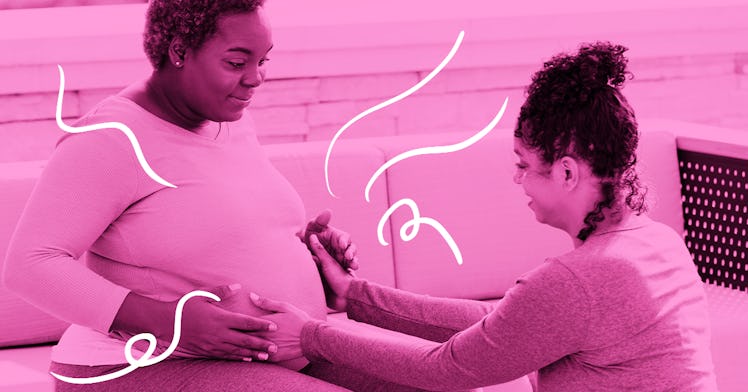How Doulas Can Improve The Black Infant Mortality Rate Crisis
Portland, Oregon's Black Parents Initiative is an example of how to make birth safer for Black mothers and babies

The United States has a Black infant mortality crisis and no easy route to solve it. In 2018, the Infant Mortality Rate (IMR) for Black babies was 10.8 per 1,000 live births, which is over double the rate of white babies in the U.S. and nearly double the national average of 5.9 per 1,000 live births. That places America 26th among developed nations (behind Hungary, Poland, and Slovakia) in infant mortality. A study in the Ohio Journal of Public Health last year offered a damning interpretation of the dire statistics. Researcher in the ongoing study Benefits of Understanding Systemic Racism in Forming Clinician-Patient Relationships to Reduce Black Infant Mortality concluded that “These national statistics belie deep geographic, health care access, and, especially, racial disparities: the gap between White and Black IMR is worse now than it was in 1850.”
The Case for Doulas
The Sacred Roots Doula program from the Black Parent Initiative (BPI) in Portland, Oregon is trying to turn the stats around. The program seeks to empower Black mothers and dismantle some of the inequalities that contribute to disproportionately high rates of black maternal mortality and Black infant mortality. BPI’s overarching mission is to educate and mobilize the parents and caregivers of African, African American, and African American Multi-cultural children to ensure they achieve success. The Sacred Roots program helps accomplish this by providing doula support to Black and Multi-Ethnic families from the prenatal period through the postpartum period.
“Parents in our community aren’t always aware that they have options, especially in areas where there is not a great deal of child health education beyond going to the doctor,” explains Sacred Roots Program Manager Linda Bryant-Daaka.
She notes that having someone to talk through the labor and delivery process ahead of time helps mothers get comfortable with their rights as a patient and the ways they can voice their desires and concerns to their doctor. “Having that instruction lets people know what their options are before they give birth so they can consider what their desires are for labor and delivery.”
BPI gets connected with families through an extensive network that includes The Healthy Birth Initiative, hospitals, and birthing centers. Once BPI implements a holistic relationship-based approach where doulas work with families who share lived demographic experiences. They deliver one-on-one mini-childhood education sessions, make prenatal visits, support the mom during the birth, and offer postpartum visits tailored to the mother’s individual needs.
The Importance of Doulas With Shared Lived Experiences
The benefits of the Sacred Roots program are multi-faceted. Hiring black doulas opens up income and career paths for black women in a field that has lacked representation and diversity. They, in turn, can build a trusting and collaborative relationship with moms more quickly. Bryant-Daaka explains that shared experience can be critical to the patient-doula relationship. “They have an intimate knowledge of what it means to live in this skin, so they can better relate to that,” she says. “It’s not to say someone from a different culture could not, but it’s an experience that says, ‘I see you.’”
That trust opens up important lines of communication, as doulas rely on open feedback from their clients to offer the most effective service possible. Assistance includes taking care of household tasks such as meal preparation, light cleaning, and care of siblings so that parents can rest and recover. But it can also involve talking through the birthing experience and how the mom is processing being back home. Postpartum doulas can also help prevent isolation and preliminarily assess if mom has any signs of postpartum depression. “Sometimes, when you leave the hospital, you may not have people looking after the mom until the postpartum checkup,” Bryant-Daaka says. “It’s vital to give moms plenty of opportunities to share how they are feeling about the experience.”
Doula Lactation Support
The other key role that postpartum doulas can play in supporting new moms in lactation. BPI recently trained 20 Certified Lactation Counselors (one level down from a lactation consultant), which allows them to teach classes, be the first contact for lactation issues, and extend lactation services into the home.
“If you can have someone who can come to your home to help you get comfortable with the dyad between mother and baby in your environment, it makes for an easier transition to feel comfortable and confident,” says Bryant-Daaka. “It’s empowering to have someone affirm you and it’s encouraging when your doula can check-in to suggest possible adjustments.”
The benefits of breastfeeding extend to both mom and baby. According to the CDC, breastfed infants “have a lower risk of asthma, obesity, ear and respiratory infections, sudden infant death syndrome, and gastrointestinal infections such as diarrhea.” Additionally, breastfeeding also lowers a mother’s risk of high blood pressure, type-2 diabetes, and breast and ovarian cancers.
Bryant-Daaka sees postpartum doula and lactation support as key to reversing the longstanding trends in the health of Black moms and their babies. “We are talking about changing the overall direction of health in the community. We’re talking about changing the direction of the future for those babies to have better health, and it’s a framework for the community to have better health.”